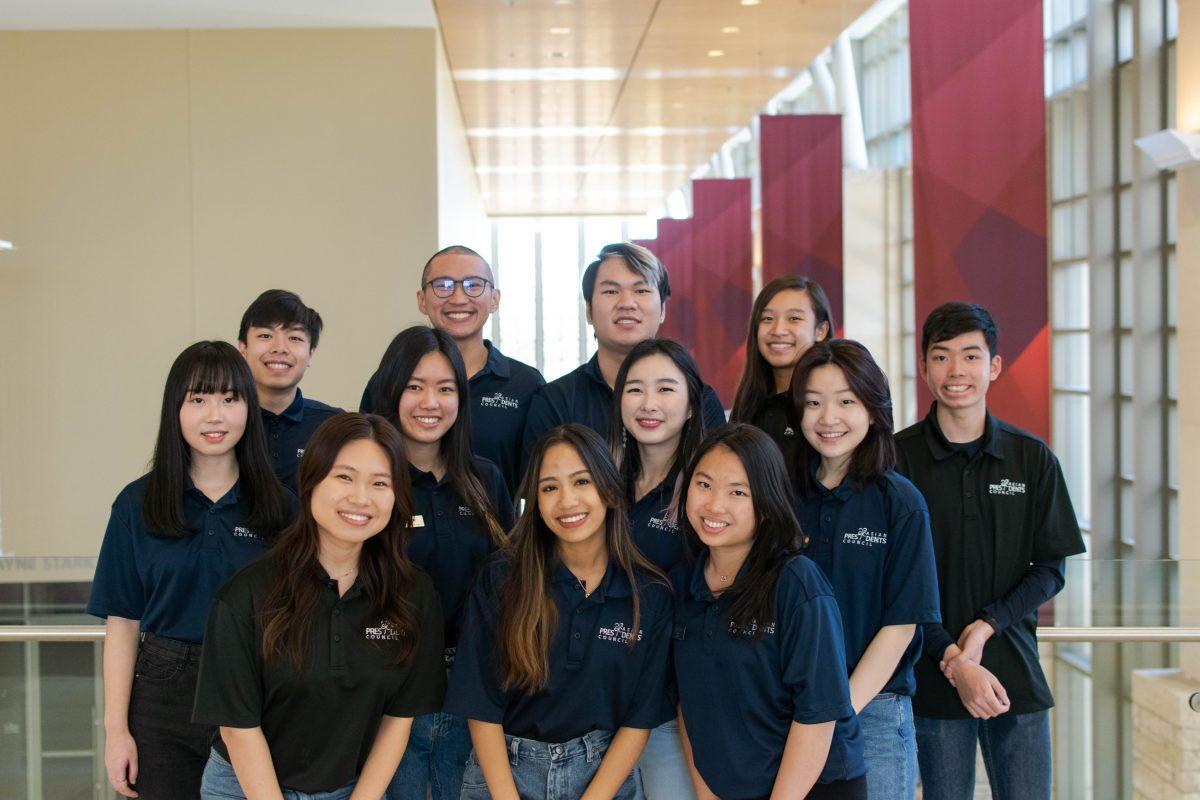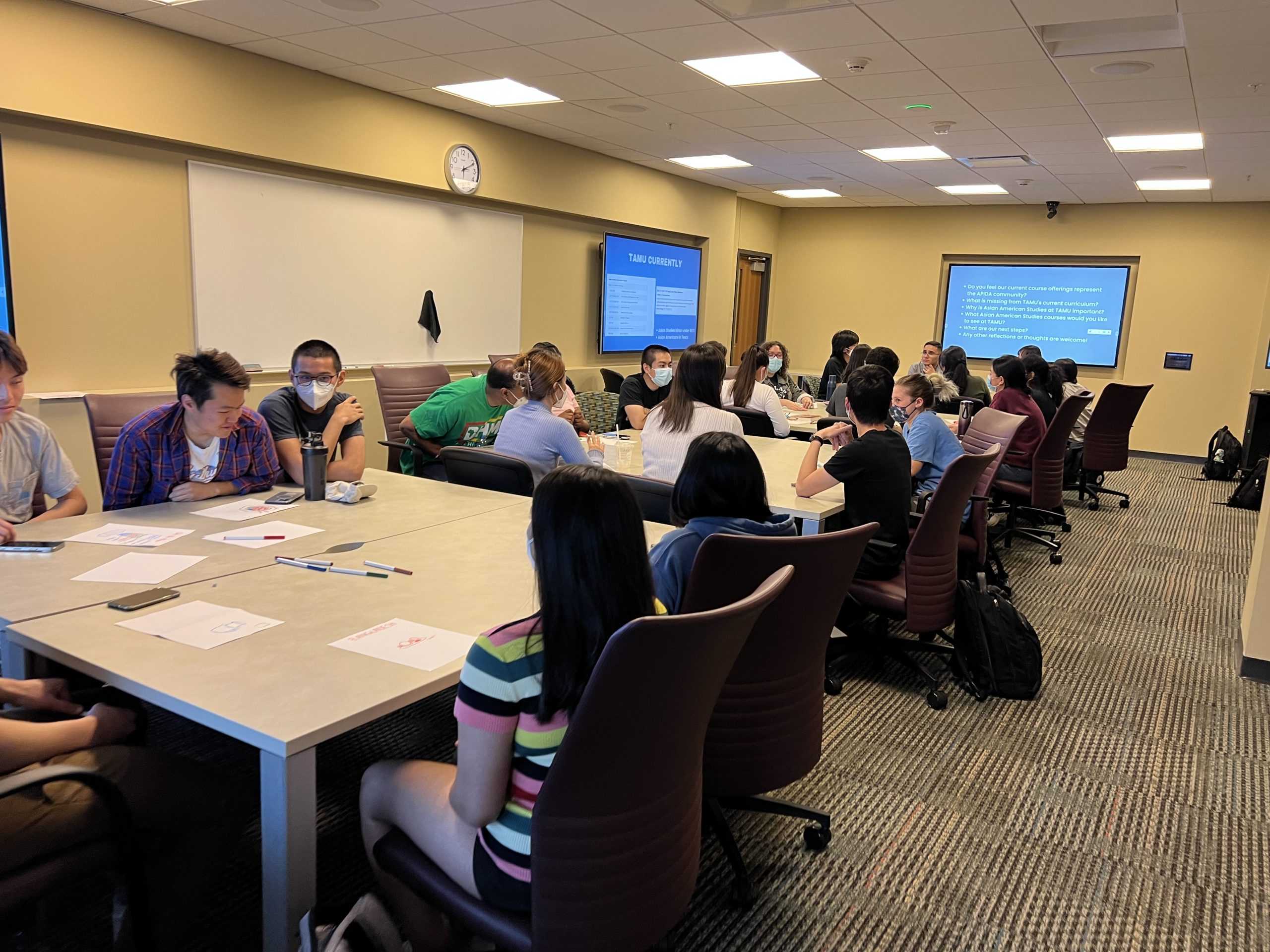In the middle of Asian Pacific American Heritage month, a group of undergraduate students are banding together to advocate for an Asian American studies program at Texas A&M.
Seeing a lack of Asian American focused studies at the university, a team of undergraduate students have established the TAMU Asian American Studies Initiative, spearheaded by the Asian Presidents’ Council, to lobby for increased programming at the university level, which began in February. At the beginning of April, the students in the initiative released a statement complete with Asian American history, research on student interest and demands for the university, for which the group is now collecting signatures to garner support before taking the statement to administration.
Though there are classes which may touch on Asian American studies briefly in a unit, the group believes the university can be doing more to advocate for the education of the ethnic group, student organizer and sociology sophomore Erin Feng said.
“Asian American studies is not just for Asian American students. It would really benefit the university as a whole because it would give all students the chance to learn more about Asian American history, because [it] gets left out a lot,” Feng said. “It really feels [like] the idea that Asian Americans are foreigners or that we haven’t been here, just because we aren’t in a lot of history textbooks and because we aren’t in the course catalog, it sends a message that it’s almost like we don’t belong here.”
After a talk by visiting assistant history professor Rachel Lim regarding her experience as an Asian American in the South, international studies junior Stella Lee said the group was perplexed as to why there were no classes at the university to portray this experience and history to the campus community.
“All this information is so interesting and there’s no reason that we shouldn’t have this at Texas A&M because we are such a present group on campus,” Lee said. “That really helped us feel like we had to start something and then we really looked at other school’s progress with Asian American studies . . . and that really made us feel empowered to start something because they were also just undergraduate students fighting for something they believed in.”
After doing some research, the students found out that many Asian American programs at other universities, such as Dartmouth and Duke, began from student-led interest groups, Feng said.
“[Dartmouth] started after the Atlanta spa shooting last March, so they were really an inspiration that we looked up to, because they’ve been relatively fast in doing so and their administration responded,” Feng said. “Duke has been organizing since the [19]70s or [19]80s and they just got their minor literally a few weeks ago.”
Having shown past success with the student movements, international studies junior Andrea Miranda said she looks to the development of the Latino and Mexican American minor at A&M for inspiration while working toward a similar goal for the Asian American community.
“Using the same steps that the Asian American Studies Initiative has done — organize themselves among many Latinx student organizations and they created movements and created petitions and met with administration, met with faculty,” Miranda said. “In the end, they were very fortunate to have administration listen to the desire of their students [to] create [and] implement an [Latino and Mexican] studies program within the College of Liberal Arts. We already have this history of it working for other communities and I’m hoping the same thing can be said about Asian American Studies Initiative.”
On March 3, the initiative group held its first student forum where approximately 40 attendees shared their support and opinions on the need for more Asian American programs.
“From what we heard at our forum, a lot of students expressed that they wanted an entry level course and a core curriculum that’d be open at an intro level, Asian American Studies, and then some people express[ed] upper-level courses that are about Asians,” Feng said. “A lot of students have also expressed interest in a minor and graduate certificates.”
Miranda said she attended the forum to gauge what other students had to say about the idea and was very impressed with the extensive research that was presented. As a student senator, she said she hopes to work with the Student Government Association, or SGA, to bring awareness to the program idea.
“[I hope to] work with student government to see if there’s any way that [SGA] could take this on to the student level and [help by] making those connections with administration and then getting feedback from either administration or from student senators to kind of cement this and this initiative to get the ball rolling in the future,” Miranda said.
As the fastest growing ethnic group in the U.S., Asian American populations have seen a vast increase in Texas alone with a growth of 83.7% in the Fort Bend area between 2010 and 2020, according to the Houston Chronicle. Feng said the numbers show the importance of representation in academia.
“Texas has the third-highest population of Asian Americans in the country and just in general, Asian Americans are the fastest growing minority group in the United States,” Feng said. “The message that [the university] sent toward me when I was looking for classes is that we’re not worthy of having a space in academia that’s dedicated toward studying our own experience.”
With the growth of the Asian American population at A&M, Lee said the university should recognize the need for complete representation in academics.
“[Asian American studies are] important because [Asian Americans] are present in America and it’s almost a natural response for us to have courses about us,” Lee said. “Asian Americans are one of the fastest growing demographics in Texas, so it makes sense that since we are a state school, we should kind of make sure that we are represented in the curriculum.”
With many misconceptions about the difference between Asian and Asian American people, Miranda said it is important to bring awareness to both communities and their respective differences.
“Being Mexican American, I understand some of the difficulties of people not realizing there’s a huge difference between either being Mexican or Mexican American,” Miranda said. “That’s one of the courses that we have at Texas A&M … they were just courses that were probably outdated that need some adding to.”
Even in her own friend group, Lee said many people do not know that there is a lack of Asian American programming at the university.
“I hope that we can continue to reach a wider group of people … to let people know what A&M is lacking right now,” Lee said. “I want people to stay informed [now], but also down the road. I hope that we’re fully recognized by the university as a group. There’s a long history of Asian Americans on campus, and we just haven’t received the proper recognition yet, so we’re aiming for that and that could be in the form of a department, a center [or] a minor certificate.”
As of publication, 21 student organizations and 451 individuals had signed the statement in support of Asian American studies at A&M. Interested parties can learn more about the initiative on the group’s Instagram, Twitter or Linktree and can support by signing the statement online, Feng said.
“A large part of the reason why we did this is because Asian Americans have been at A&M for a long time,” Feng said. “We believe that creating Asian American studies courses at A&M and eventually getting a program would be a good step in that direction to acknowledging our presence and our history at A&M.”
On April 7, the group posted on its social media about a new offering of a History of Asian American course taught by Lim beginning in the fall.
Since the launch of the statement, organizers have since heard from the Office of the Provost and plan to have a meeting to discuss the initiative.





















